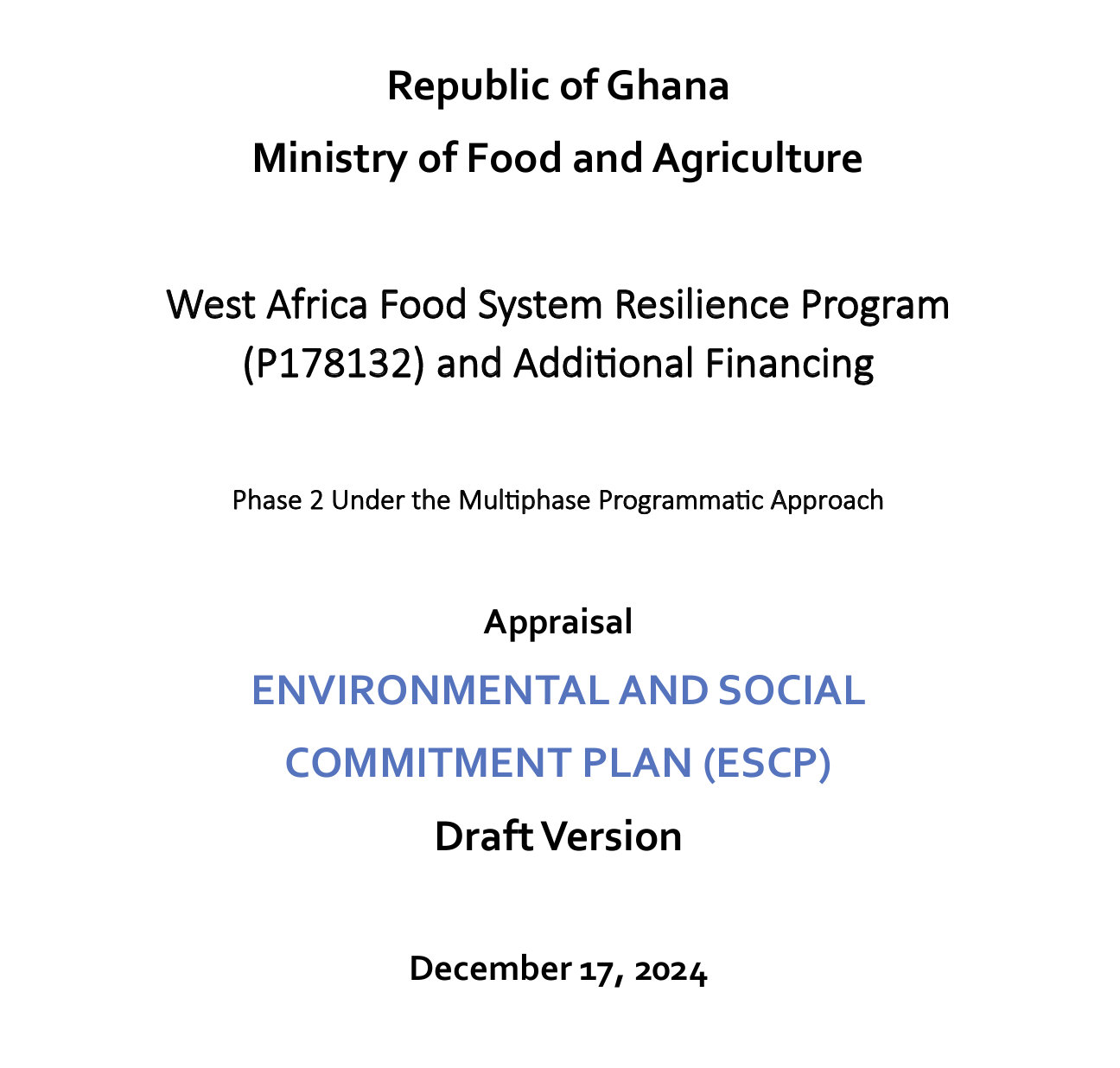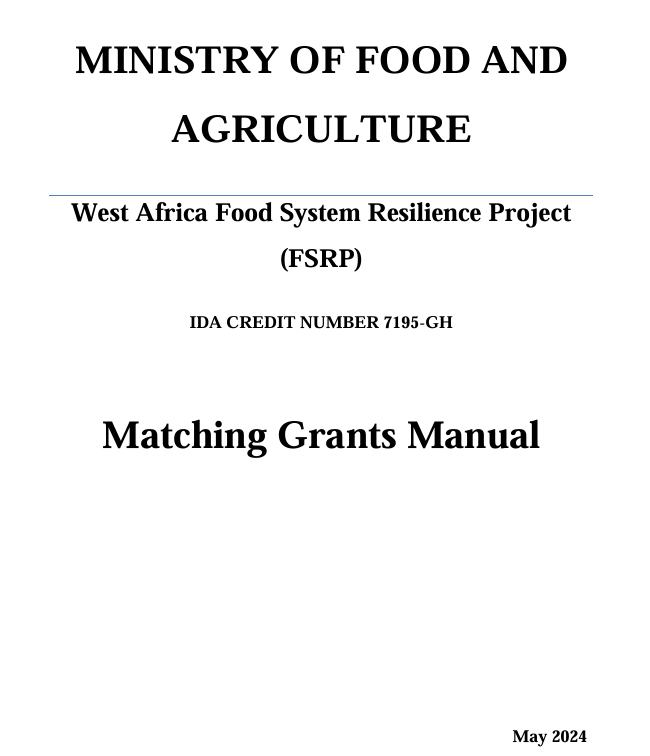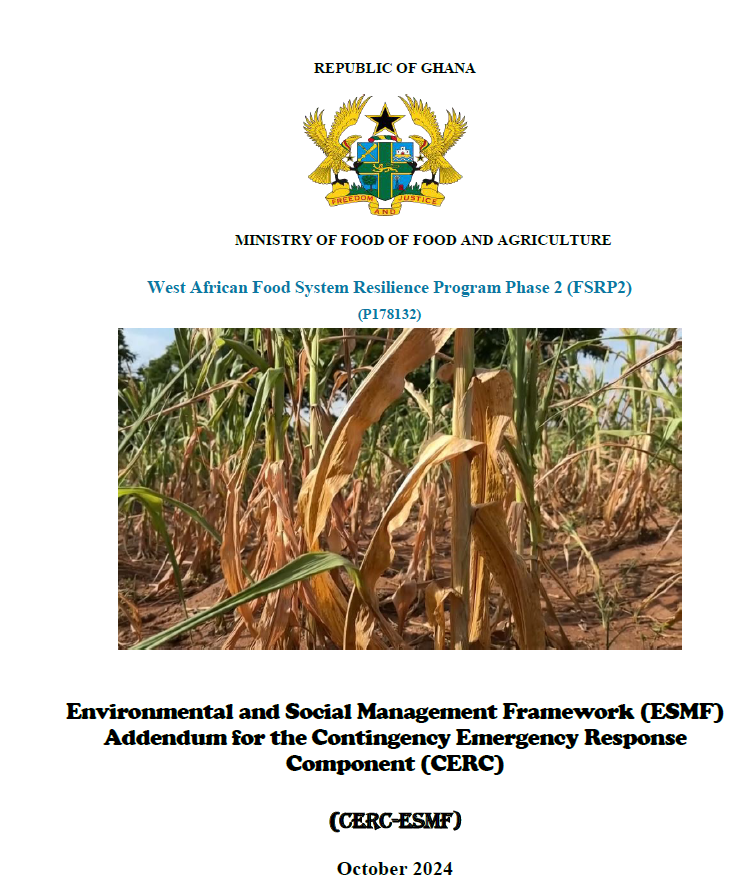FSRP Publication
 1. The Republic of Ghana (the Recipient) is implementing the West Africa Food System Resilience Program – Phase 2 under the Multiphase Programmatic Approach Project (the Project), with the involvement of the Ministry of Food and Agriculture (MoFA), as set out in: (i) the financing agreement (Credit No. 7195-GH) dated May 22, 2023 (the “Original Financing Agreement”), between the Recipient and the International Development Association (“Association”), (ii) the additional financing agreement (Grant No. TF0C4998) dated July 12, 2024 (the “FS2030 Additional Financing Agreement”), between the Recipient and the International Bank for Reconstruction and Development and the Association (collectively, the “Bank”), acting as administrator of the Food Systems 2030 Multi-Donor Trust Fund; (iii) the second additional financing agreement (Grant No. C7695-001) dated March 13, 2025 (the “Second FS2030 Additional Financing Agreement”) between the Recipient and the Bank, acting as administrator of the Food Systems 2030 Multi-Donor Trust Fund; and (iv) the additional financing agreement (Credit No. 77640-001) dated March 13, 2025 (the “IDA Additional Financing Agreement”) between the Recipient and the Association (collectively, the “Agreements”). The Association has agreed to provide the original and additional financings (P178132), and the Bank, acting as administrator of the Food Systems 2030 Multi-Donor Trust Fund, has agreed to provide additional financings (P181488) for the Project, as set out in the Agreements. This ESCP supersedes previous versions of the ESCP for the Project and shall apply both to the original and the additional financings (P178132 and P181488) for the Project referred to above. The Bank and the Association shall be together referred to hereinafter as the “Bank”.
1. The Republic of Ghana (the Recipient) is implementing the West Africa Food System Resilience Program – Phase 2 under the Multiphase Programmatic Approach Project (the Project), with the involvement of the Ministry of Food and Agriculture (MoFA), as set out in: (i) the financing agreement (Credit No. 7195-GH) dated May 22, 2023 (the “Original Financing Agreement”), between the Recipient and the International Development Association (“Association”), (ii) the additional financing agreement (Grant No. TF0C4998) dated July 12, 2024 (the “FS2030 Additional Financing Agreement”), between the Recipient and the International Bank for Reconstruction and Development and the Association (collectively, the “Bank”), acting as administrator of the Food Systems 2030 Multi-Donor Trust Fund; (iii) the second additional financing agreement (Grant No. C7695-001) dated March 13, 2025 (the “Second FS2030 Additional Financing Agreement”) between the Recipient and the Bank, acting as administrator of the Food Systems 2030 Multi-Donor Trust Fund; and (iv) the additional financing agreement (Credit No. 77640-001) dated March 13, 2025 (the “IDA Additional Financing Agreement”) between the Recipient and the Association (collectively, the “Agreements”). The Association has agreed to provide the original and additional financings (P178132), and the Bank, acting as administrator of the Food Systems 2030 Multi-Donor Trust Fund, has agreed to provide additional financings (P181488) for the Project, as set out in the Agreements. This ESCP supersedes previous versions of the ESCP for the Project and shall apply both to the original and the additional financings (P178132 and P181488) for the Project referred to above. The Bank and the Association shall be together referred to hereinafter as the “Bank”.
2. The Recipient shall ensure that the Project is carried out in accordance with the Environmental and Social Standards (ESSs) and this Environmental and Social Commitment Plan (ESCP), in a manner acceptable to the Bank. The ESCP is a part of the Unless otherwise defined in this ESCP, capitalized terms used in this ESCP have the meanings ascribed to them in the Agreements.
3. Without limitation to the foregoing, this ESCP sets out material measures and actions that the Recipient shall carry out or cause to be carried out, including, as applicable, their respective timeframes; institutional, staffing, training, monitoring and reporting arrangements; and grievance management. The ESCP also sets out the environmental and social (E&S) documents that shall be prepared or updated, consulted, disclosed and implemented under the Project, consistent with the ESSs, in form and substance acceptable to the Bank. Said E&S documents may be revised from time to time with prior written agreement by the Bank. As provided for under the referred Agreements, the Recipient shall ensure that there are sufficient funds available to cover the costs of implementing the ESCP.
4. As agreed by the Bank and the Recipient, this ESCP will be revised from time to time, if necessary, to reflect adaptive management of Project changes or unforeseen circumstances or in response to Project performance. In such circumstances, the Bank and the Recipient agree to update the ESCP to reflect these changes through an exchange of letters signed between the Bank and the Recipient’s Representative specified in the Agreements. The Recipient shall promptly disclose the updated ESCP.
5. The subsection on “Indicators for Implementation Readiness” below identifies the actions and measures to be monitored to assess Project readiness to begin implementation in accordance with this ESCP. Nevertheless, all actions and measures in this ESCP shall be implemented as set out in the “Timeframe” column below irrespective of whether they are listed in the referred subsection.
 1. The Republic of Ghana (the Recipient) is implementing the West Africa Food System Resilience Program – Phase 2 under the Multiphase Programmatic Approach Project (the Project), with the involvement of the Ministry of Food and Agriculture (MoFA), as set out in the Financing Agreement and the Grant Agreement (the Agreements). The International Development Association (IDA) has agreed to provide the original financing (P178132) and the International Bank for Reconstruction and Development (IBRD) and the IDA (IBRD and IDA together, the Bank) acting as the administrator of the Food Systems 2030 Multi-Donor Trust Fund, have agreed to provide additional financing for the Project, as set out in the referred agreements. This ESCP supersedes previous versions of the ESCP for the Project and shall apply both to the original and the additional financing (P181488) for the Project referred to above.
1. The Republic of Ghana (the Recipient) is implementing the West Africa Food System Resilience Program – Phase 2 under the Multiphase Programmatic Approach Project (the Project), with the involvement of the Ministry of Food and Agriculture (MoFA), as set out in the Financing Agreement and the Grant Agreement (the Agreements). The International Development Association (IDA) has agreed to provide the original financing (P178132) and the International Bank for Reconstruction and Development (IBRD) and the IDA (IBRD and IDA together, the Bank) acting as the administrator of the Food Systems 2030 Multi-Donor Trust Fund, have agreed to provide additional financing for the Project, as set out in the referred agreements. This ESCP supersedes previous versions of the ESCP for the Project and shall apply both to the original and the additional financing (P181488) for the Project referred to above.
2. The Recipient shall ensure that the Project is carried out in accordance with the Environmental and Social Standards (ESSs) and this Environmental and Social Commitment Plan (ESCP), in a manner acceptable to the Bank. The ESCP is a part of the Agreements. Unless otherwise defined in this ESCP, capitalized terms used in this ESCP have the meanings ascribed to them in the Agreements.
3. Without limitation to the foregoing, this ESCP sets out material measures and actions that the Recipient shall carry out or cause to be carried out, including, as applicable, their respective timeframes; institutional, staffing, training, monitoring and reporting arrangements; and grievance management. The ESCP also sets out the environmental and social (E&S) documents that shall be prepared or updated, consulted, disclosed and implemented under the Project, consistent with the ESSs, in form and substance acceptable to the Bank. Said E&S documents may be revised from time to time with prior written agreement by the Bank. As provided for under the referred Agreements, the Recipient shall ensure that there are sufficient funds available to cover the costs of implementing the ESCP.
4. As agreed by the Bank and the Recipient, this ESCP will be revised from time to time, if necessary, to reflect adaptive management of Project changes or unforeseen circumstances or in response to Project performance. In such circumstances, the Bank and the Recipient agree to update the ESCP to reflect these changes through an exchange of letters signed between the Bank and the Recipient’s Representative specified in the Agreements or the Recipient’s Chief Director of MoFA. The Recipient shall promptly disclose the updated ESCP.
5. The subsection on “Indicators for Implementation Readiness” below identifies the actions and measures to be monitored to assess Project readiness to begin implementation in accordance with this ESCP. Nevertheless, all actions and measures in this ESCP shall be implemented as set out in the “Timeframe” column below irrespective of whether they are listed in the referred subsection.
 1. INTRODUCTION
1. INTRODUCTION
1.1 Purpose and Structure of the Matching Grants Manual
The purpose of this manual is to provide guidance and information on the management of the Matching Grants Scheme (MGS) to persons directly involved in Matching Grant sub-projects implementation such as project staff, service providers, potential applicants and beneficiaries. The manual has been prepared to ensure effective and efficient use of funds through:
• Guidelines for implementation
• Segregation of duties
• Allocation of funds to beneficiaries that meet funding criteria specified for grant eligibility set out in this manual and in accordance with fiduciary policies and procedures
• Safeguard of assets
• Accuracy and reliability of the accounting records
• Facilitation of reporting, monitoring and evaluation.
The manual consists of the following principal parts:
i. an outline of governance and management structure of the matching grants scheme
ii. a description of the core business areas and the modalities of the scheme,
iii. an outline of the different steps of the grant cycle, and
iv. an overview of administrative principles and procedures.
Each of these parts is subdivided into sections providing detailed information and guidance on management and administration of the MGS.
The manual can be accessed from the project website (www.fsrp.org.gh). The website version takes precedence over other versions of the manual.
1.0 INTRODUCTION
1.1 Background
The Government of Ghana (GoG) (WB) has secured funding from the World Bank to undertake the Food System Resilience Program (FSRP2) under the World Bank Multi-phase Programmatic Approach (MPA) for Investment Project Financing Instrument. The FSRP2 is expected to be implemented over a 5-year period and aims to boost preparedness against food insecurity and improve the resilience of food systems in Ghana. The program will be implemented in collaboration with the Economic Community of West African States (ECOWAS), the Permanent Interstate Committee for Drought Control in the Sahel (Comité permanent Inter-Etats de Lutte contre la Sécheresse dans le Sahel, CILSS) and the West and Central African Council for Agricultural Research and Development (Conseil ouest et centre africain pour la recherche et le développement agricoles, CORAF).
Under the FSRP2, the Ministry of Food and Agriculture (MoFA) intends to complete some outstanding activities started under the Ghana Commercial Agriculture Project (GCAP - P114264 and P162525), specifically to complete rehabilitation of Kpong Irrigation Scheme (KIS) located in the Greater Accra and Eastern Regions of Ghana.
GCAP prepared Environmental and Social Impact Assessment (ESIA) and Environmental and Social Management Plan (ESMP) for the rehabilitation and modernisation of the KIS in 2018. However, due to inadequate funds to complete works at the KIS, the ESIA and ESMP of KIS must be updated to account for any significant changes including baseline conditions, new stakeholders etc., which might have changed the potential risks and impacts associated with these works.
The KIS is located within the Lower Volta Basin in the Eastern and Greater Accra Regions of Ghana. The initial scope of work under GCAP was a full rehabilitation and modernization of the scheme covering structures in Sections A and B and the Re-lift pump station at section C of the Scheme. However, the full scope of works was not attained due to reduced project funding as a result of the need to fund the rehabilitation of the Tono Dam Spillway in the Upper East Region due to an emergency situation which was not initially planned. The WB approved changes in output deliverables and the scope of work was varied. Although the proposed full scope of work was not completed, the functionality of KIS was achieved. The scope reduction has become a limiting factor to the full operationalization of the KIS and its impacts include:
- Further deterioration of sections of the canal embankment of the main water conveyance system (Akuse Main Canal).
- Increased water use and efficiency challenges for the 600ha farming areas where the pipe works were not carried out.
- Transport challenges of farm produce due to the bad road network for some areas where road rehabilitation could not be carried out.
- Increased agitation and social conflict from farmers whose canals were not lined.
The proposed works at KIS under this phase will include:
- Lining of the Akuse Main Canal;
- Completing the pipe works for 600ha farming area in section A;
- Automation of the irrigation system; and
- Completing the rehabilitation of farm roads.
Objective of the Update of ESIA
The Environmental and Social Management Framework (ESMF) prepared for the FSRP 2 requires that site specific Environmental and Social Impact Assessments (ESIA) and Environmental and Social Management Plan (ESMP) be prepared for each irrigation scheme. The aim of the ESIA studies is to assess the environmental and social risks and impacts associated with the design, construction and operation of the rehabilitation and modernisation of the Kpong Irrigation Schemes. The ESIA proposes practical and effective measures to prevent or mitigate any potential negative impacts of the subprojects. In addition, an ESMP has been developed to ensure best environmental and social performance.
Given that the ESIA for the KIS under the GCAP was prepared under the WB Operational Policies (OPs) and since the FSRP2 was prepared under the WB Environmental and Social Framework (ESF), there is a need to revise the ESIA to comply with the requirements of the relevant WB Environmental and Social Standards (ESSs). Moreover, the baseline conditions could have changed in the last four (4) years (2018) since the ESIA was prepared, hence the need to update the ESIA to account for any significant changes in baseline conditions, new stakeholders etc., which might have changed the potential risks and impacts associated with the subproject.
The update of the existing ESIA now aligns with the requirements of the ESF and includes measures to prevent child labour and forced labour, community health and safety as well as Sexual Exploitation and Abuse (SEA) and Sexual Harassment (SH). This is because even though these are carry-over works from the GCAP, they are being funded and implemented under FSRP2 which is guided by the ESF, and not the Operational Policies (OPs) under which the existing ESIA was prepared.


